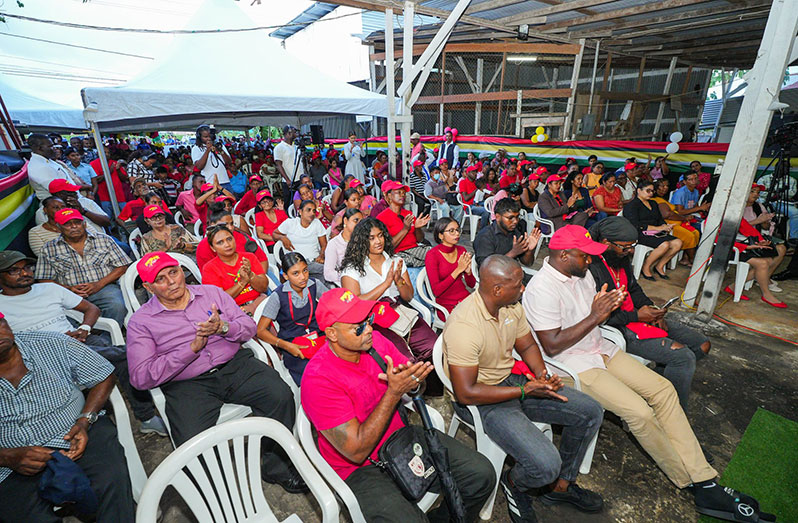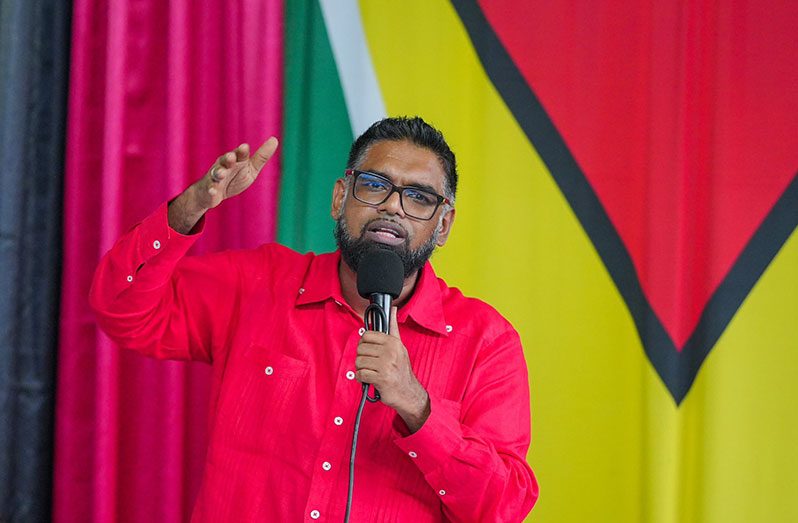PRESIDENT Dr. Irfaan Ali has announced a new initiative aimed at empowering women in the West Bank Demerara (WBD) communities of Canal Number One and Bagotville through sustainable agricultural practices.
During a community meeting at Canal Number One on Thursday, the Head of State said that the government is seeking to partner with 100 women in the community to establish shade houses in their backyards, fostering a path to self-reliance and economic growth.
“We want to identify 100 women in this Canal and Bagotville area, and we want to help you to put a shade house in your yard so that you can produce; so that you can plant celery, and it goes to the market,” the President told the enthusiastic gathering, adding: “We want to empower 100 families by empowering 100 women.”
The shade house project is expected to significantly boost household incomes by allowing participants to cultivate high-value crops such as celery, lettuce, and other vegetables that thrive in protected agricultural environments.
According to Dr. Ali, the initiative is not just about food production, but about transforming lives through economic independence.
He emphasised that supporting them in becoming producers and entrepreneurs would have far-reaching benefits.
“Because when you empower women, you are empowering the entire community,” he affirmed, drawing applause from the audience.
This programme is part of the government’s broader strategy to enhance food security, reduce poverty, and create sustainable livelihoods at the grassroots level.
Dr. Ali said that the projects form part of his administration’s new strategy to develop localised economies, a concept he coined as ‘grassnomics’, short for grassroots economics.
The initiative is also aligned with Guyana’s Low-Carbon Development Strategy (LCDS) 2030, which promotes climate-smart agriculture and environmentally-friendly livelihood solutions.
Shade house farming uses less water, requires minimal land, and provides higher yields.

In addition to the women-focused programme, President Ali also highlighted opportunities for the youth in the area, particularly in aquaculture and cage farming.
“We want to find young people in this area who are interested in aquaculture and cage farming,” the President said, pointing to the growing demand for fish and seafood, and the vast potential Guyana holds in the sector.
He stated that technical training and start-up support would be available for interested youths, and as such, urged them to collaborate and submit a proposal to the government.
Dr. Ali said: “…We can do the tambaqui and the other fishes that can work in the cage farming. If we have that group ready, we will give you the cages; we will invest in you, we will give you the start-up and those cages to produce the fishes.”
Several residents expressed excitement at the idea of being given tools and resources to transform their lives, and contribute to their families and the wider economy.
The President’s visit forms part of a nationwide outreach aimed at directly engaging citizens, listening to their concerns, and rolling out targeted solutions for inclusive development.




.jpg)









